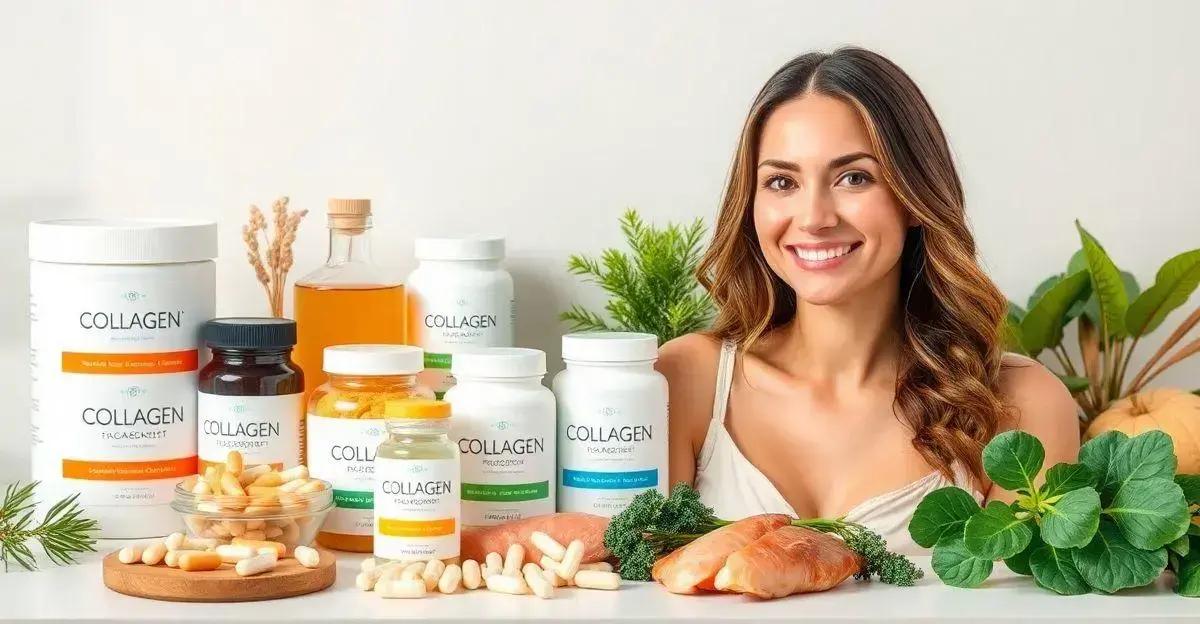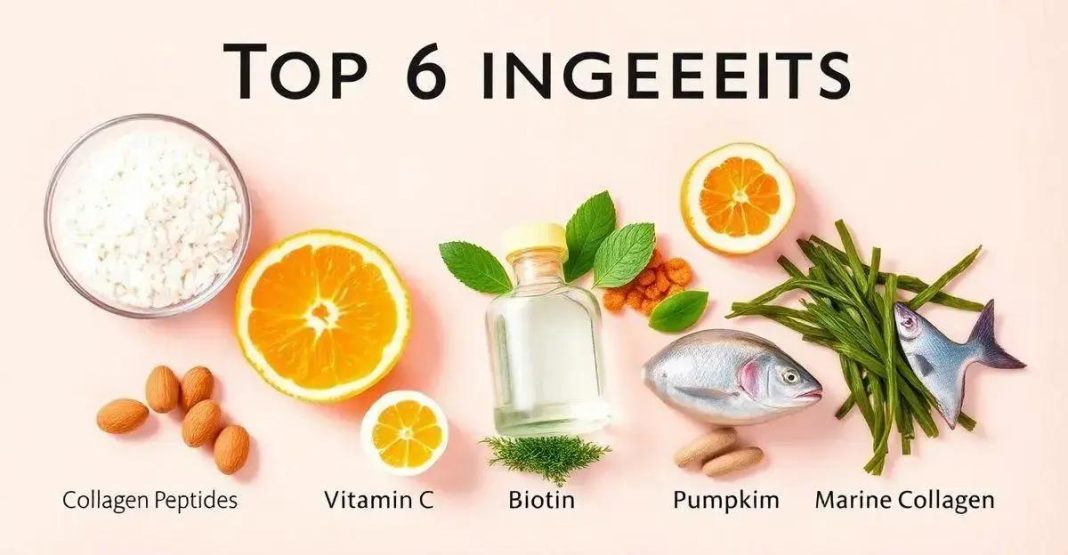Collagen is an essential protein that supports skin, joint, and overall health, with key ingredients like amino acids, vitamin C, and hyaluronic acid. Popular sources include marine and bovine collagen, each providing unique benefits. When selecting a collagen supplement, consider the source, form, additional ingredients, and product quality to enhance skin elasticity, improve joint function, and promote overall wellness.
Collagen is a crucial protein that our bodies produce naturally, playing a vital role in maintaining skin elasticity, joint health, and overall vitality. However, as we age, our collagen production declines, making it essential to understand the ingredients in collagen supplements.
This article will explore the top ingredients found in collagen products that can enhance your health and beauty.
What is Collagen?
Collagen is the most abundant protein in our bodies, making up about 30% of our total protein content. It serves as a fundamental building block for our skin, bones, tendons, ligaments, and muscles, providing structure and strength. Think of collagen as the glue that holds everything together, giving our skin its elasticity and firmness while also supporting our joints and overall mobility.
As we age, our body’s natural production of collagen starts to decline, typically around the age of 25. This reduction can lead to visible signs of aging, such as wrinkles, sagging skin, and joint discomfort. That’s why many people turn to collagen supplements to help replenish their levels and promote a youthful appearance.
Collagen comes in various forms, including collagen peptides, which are broken down into smaller chains of amino acids for better absorption. These peptides can be derived from different sources, including bovine, marine, and even plant-based options, each offering unique benefits.
Incorporating collagen into your diet, whether through supplements, bone broth, or collagen-rich foods, can significantly support skin health, joint function, and overall wellness. It’s a key player in maintaining a youthful and vibrant lifestyle.

The Role of Amino Acids
Amino acids are the building blocks of proteins, and they play a crucial role in the formation of collagen.
Collagen itself is made up of a unique combination of amino acids, primarily glycine, proline, and hydroxyproline. These amino acids are essential for maintaining the structure and integrity of collagen fibers, which are vital for healthy skin, hair, nails, and connective tissues.
Glycine, the most abundant amino acid in collagen, helps provide strength and flexibility to the collagen structure. It also plays a role in the production of creatine, which is important for energy metabolism.
Proline is essential for collagen stability, while hydroxyproline helps stabilize the collagen molecule, ensuring it maintains its shape and function.
When you consume collagen supplements, your body breaks them down into these individual amino acids, which can then be utilized to synthesize new collagen. This process is particularly important as we age, as it helps combat the natural decline in collagen production.
In addition to directly supporting collagen formation, amino acids also contribute to overall health. They can aid in muscle recovery, promote healthy skin, and enhance immune function.
By ensuring you have an adequate intake of amino acids, whether through diet or supplements, you can support your body’s collagen production and enjoy the numerous benefits it brings.
Benefits of Vitamin C in Collagen
Vitamin C is a powerful antioxidant that plays a pivotal role in collagen synthesis. Without adequate vitamin C, the body cannot effectively produce collagen, leading to weakened connective tissues and compromised skin health. This vitamin is essential for the hydroxylation of proline and lysine, amino acids that are critical for stabilizing the collagen structure.
One of the key benefits of vitamin C is its ability to enhance the body’s natural collagen production. By providing the necessary co-factors for collagen formation, vitamin C helps ensure that the collagen fibers produced are strong and resilient. This is why many collagen supplements and skincare products often include vitamin C as a key ingredient.
Additionally, vitamin C’s antioxidant properties help protect collagen from damage caused by free radicals, which can lead to premature aging and skin degradation. By neutralizing these harmful molecules, vitamin C not only supports collagen health but also promotes a brighter, more even skin tone.
Moreover, vitamin C also aids in wound healing and helps reduce inflammation, further enhancing the skin’s overall appearance and health. Incorporating vitamin C-rich foods, such as citrus fruits, strawberries, bell peppers, and leafy greens into your diet can boost your collagen production and support your skin’s vitality.
In summary, vitamin C is an indispensable nutrient for collagen health, making it essential for anyone looking to maintain youthful skin and robust connective tissues.

Hyaluronic Acid: The Hydration Hero
Hyaluronic acid is often hailed as the “hydration hero” in the skincare and wellness world, and for good reason! This powerful substance is a naturally occurring glycosaminoglycan found in our bodies, particularly in connective tissues, skin, and cartilage. Its primary function is to retain moisture, making it a crucial player in maintaining skin hydration and elasticity.
One of the standout benefits of hyaluronic acid is its ability to hold up to 1,000 times its weight in water. This means that when you incorporate hyaluronic acid into your skincare routine or take it as a supplement, it has the potential to significantly boost your skin’s moisture levels. This increased hydration can lead to plumper, more youthful-looking skin and can help reduce the appearance of fine lines and wrinkles.
When combined with collagen, hyaluronic acid works synergistically to enhance skin health. While collagen provides the structural support, hyaluronic acid ensures that the skin remains hydrated and supple. Together, they create a powerful duo that can combat the signs of aging and promote overall skin vitality.
Moreover, hyaluronic acid is known for its anti-inflammatory properties, which can help soothe irritated skin and promote healing. It’s often featured in serums, creams, and injectable treatments, making it accessible for various skincare needs.
Incorporating hyaluronic acid into your daily routine—whether through topical applications or dietary supplements—can greatly benefit your skin and overall health, solidifying its reputation as the hydration hero.
Marine Collagen vs. Bovine Collagen
When it comes to collagen supplements, marine collagen and bovine collagen are two of the most popular options, each offering unique benefits and sources. Understanding the differences between them can help you make an informed choice based on your dietary preferences and health goals.
Marine collagen is derived from fish, primarily from the skin and scales. One of its standout features is its high bioavailability, meaning that it is easily absorbed by the body. Marine collagen is rich in type I collagen, which is beneficial for skin health, promoting elasticity and hydration. Many users report noticeable improvements in skin texture and a reduction in wrinkles after incorporating marine collagen into their routine.
On the other hand, bovine collagen is sourced from cows and typically contains both type I and type III collagen. This makes it a great option for those looking to support not just skin health, but also joint and gut health. Bovine collagen is often praised for its ability to promote muscle recovery and improve joint function, making it a favorite among athletes and active individuals.
Another significant difference lies in dietary restrictions. Marine collagen is an excellent alternative for those who avoid bovine products due to dietary or ethical reasons, such as vegetarians or individuals following a kosher or halal diet. Conversely, bovine collagen may not be suitable for those with fish allergies.
Ultimately, the choice between marine and bovine collagen will depend on your personal health goals, dietary needs, and preferences. Both types can effectively support collagen levels in the body, so it may even be worth trying both to see which one works best for you.

How to Choose the Right Collagen Supplement
Choosing the right collagen supplement can be overwhelming given the plethora of options available on the market today. However, by considering a few key factors, you can select a product that best meets your health goals and lifestyle.
First, identify the source of the collagen. As discussed, marine and bovine collagen are the most common types, each with its own benefits. If your priority is skin health, marine collagen might be the way to go due to its high bioavailability and type I collagen content. If you’re looking to support joints and muscles, bovine collagen, containing both type I and III collagen, could be more beneficial.
Next, consider the form of the supplement. Collagen is available in various forms, including powders, capsules, and liquid. Powders can be easily mixed into beverages or meals, making them a versatile option for daily use. Capsules might be more convenient for on-the-go lifestyles, while liquid collagen can offer rapid absorption.
Check the ingredient list for any additional components that could enhance the benefits of the collagen. Look for supplements that include vitamin C, hyaluronic acid, or other nutrients that support collagen synthesis and skin health. Avoid products with excessive fillers, artificial flavors, or sweeteners.
Another important aspect to consider is the sourcing and quality of the collagen. Look for products that are sourced from reputable companies that provide transparency about their ingredients and manufacturing processes. Certifications like grass-fed, non-GMO, and wild-caught can indicate a higher quality product.
Lastly, read reviews and testimonials to gauge the effectiveness of the supplement. Real user experiences can provide insight into how well the product works and any potential side effects.
By considering these factors, you can choose a collagen supplement that aligns with your health goals and lifestyle, helping you reap the many benefits of this essential protein.
Conclusion
In conclusion, understanding collagen and its essential ingredients is crucial for anyone looking to enhance their skin health, joint function, and overall well-being. From the vital role of amino acids and the protective benefits of vitamin C to the hydrating powers of hyaluronic acid, it’s clear that the right combination of components can significantly impact your collagen levels and health.
As you navigate the world of collagen supplements, whether opting for marine or bovine sources, remember to consider the quality, form, and additional ingredients of the products you choose. By making informed decisions, you can effectively support your body’s collagen production and enjoy the youthful vitality that comes with it.
Ultimately, incorporating collagen into your daily routine can lead to noticeable improvements in skin texture, joint health, and overall wellness, making it a powerful ally in your health journey.
Frequently Asked Questions about Collagen
What are the main types of collagen?
The main types of collagen are type I, type II, and type III, with type I being most abundant in skin and type II found in cartilage.
How does collagen benefit the skin?
Collagen helps maintain skin elasticity and hydration, reducing the appearance of wrinkles and promoting a youthful complexion.
Can I get collagen from food?
Yes, collagen can be obtained from bone broth, chicken skin, fish, and collagen-rich foods, as well as through supplements.
Is marine collagen better than bovine collagen?
It depends on your health goals; marine collagen is excellent for skin health, while bovine collagen supports both skin and joint health.
How long does it take to see results from collagen supplements?
Results can vary, but many users report noticeable improvements within 4 to 8 weeks of consistent use.
Are there any side effects of taking collagen supplements?
Collagen supplements are generally considered safe, but some individuals may experience mild digestive discomfort or allergic reactions.


